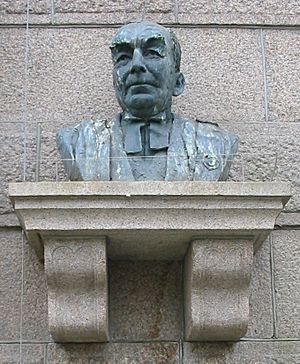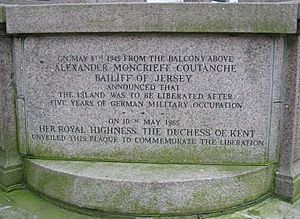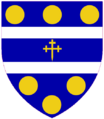Alexander Coutanche, Baron Coutanche facts for kids
Quick facts for kids
The Lord Coutanche
|
|
|---|---|

A bust of Lord Coutanche is sited on the side of the States Building in Saint Helier below the balcony from which he announced the Liberation of Jersey on 8 May 1945
|
|
| Bailiff of Jersey | |
| In office 1935–1962 |
|
| Preceded by | Charles de Carteret |
| Succeeded by | Cecil Stanley Harrison |
| Personal details | |
| Born |
Alexander Moncrieff Coutanche
9 May 1892 Saint Saviour, Jersey |
| Died | 18 December 1973 (aged 81) Saint Brélade, Jersey |
| Resting place | Saint Brélade, Jersey |
Alexander Moncrieff Coutanche, Baron Coutanche (born May 9, 1892 – died December 18, 1973) was a very important figure in Jersey's history. He served as the Bailiff of Jersey, which is like the island's chief judge and civic head. He also became a member of the House of Lords in the United Kingdom, which is part of the UK's Parliament. Lord Coutanche is especially remembered for his leadership during the German occupation of Jersey in World War II.
Contents
Early Life and Education
Alexander Coutanche was born in Saint Saviour, Jersey. He was the third child in his family. He went to school at Jersey High School and Victoria College in Jersey. After that, he studied law at the University of Caen in France.
He also tried to join the Indian Civil Service, which was a group of people who helped run India when it was part of the British Empire. However, he couldn't join because doctors found a heart problem.
Starting His Career
Even though he couldn't join the Indian Civil Service, Alexander Coutanche continued his law studies. He became a lawyer in Jersey in 1913. When World War I started in 1914, he helped the government in Jersey. Because of his heart condition, he couldn't join the army. Instead, he worked in a factory that made weapons, eventually becoming a manager. He also became a lawyer in England in 1915.
In 1917, he volunteered to help with war claims and was sent to Belgium. While there, he received two special awards: the Belgian Croix de Guerre and the Order of the Crown (Belgium). He left the army in 1920. He then returned to his law work in London and later in Jersey. In 1922, he was elected as a Deputy for Saint Helier, which meant he helped make decisions for the island.
Becoming Bailiff of Jersey
In 1925, Coutanche was appointed Solicitor-General, a senior legal role. He worked to improve the island's legal departments. In 1931, he was promoted to Attorney-General.
Then, in 1935, he became the Bailiff of Jersey. This was a very important job. The Bailiff is the chief judge and also the head of the States of Jersey, which is the island's parliament. Alexander Coutanche was the last Bailiff to be appointed for life. He was also the last one chosen directly by the King without needing to ask the States of Jersey first.
When Jersey was demilitarised in 1940, meaning the military left the island, Coutanche also took on the role of Governor of Jersey. This meant he was in charge of the island's government.
During the German Occupation (1940–1945)
In 1940, during World War II, German forces occupied Jersey. The British government told Alexander Coutanche and other officials to stay in their jobs. This was a very difficult time. Coutanche felt that staying might go against his promise to the King, but he was told it was necessary.
The States of Jersey created a "Superior Council" with the Bailiff as its head. This council helped manage the island under German rule. Coutanche tried to protect the people of Jersey as much as he could. For example, he refused to make Jewish people wear a yellow star, saying it was "a measure too far." This showed his disapproval of the German anti-Jewish policies.
On May 8, 1945, from a balcony in Saint Helier, Alexander Coutanche announced that Jersey was finally free after five years of German occupation. This was a huge moment for the island.
After the Liberation
After the war, Alexander Coutanche was honored for his service. He was made a Knight Bachelor in 1946, which meant he could use "Sir" before his name. In 1961, he was given the title of Baron Coutanche. This made him a life peer, meaning he could sit in the House of Lords for the rest of his life.
He retired as Bailiff in 1961. In the House of Lords, he first sat as a crossbencher, meaning he didn't belong to any specific political party. After retiring as Bailiff, he joined the Conservative Party. He was also recognized with honorary degrees and positions for his legal knowledge.
See Also
- Law of Jersey
- Courts of Jersey
- Bailiff of Jersey
- Judiciary of Jersey (list)
- Jurat
- Norman law
- Advocate
Images for kids
 | William L. Dawson |
 | W. E. B. Du Bois |
 | Harry Belafonte |




